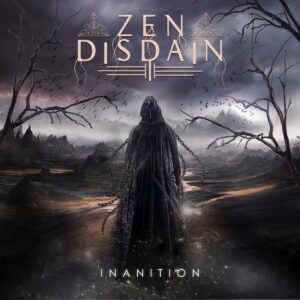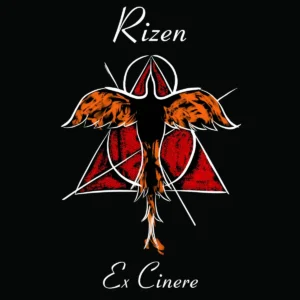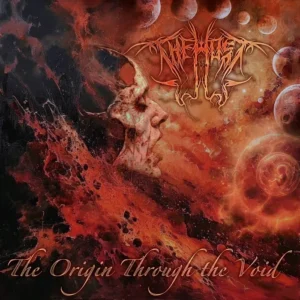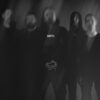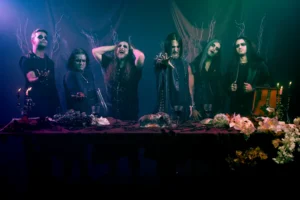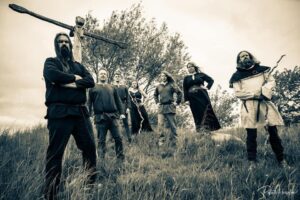Freedom of Speech
Mentalist
•
September 8, 2020
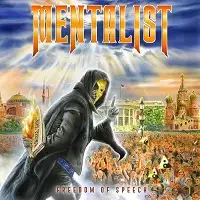
When veterans of bands go on to form a new one, chances are the parts are already firmly in place and finding a comfort zone comes quickly. That's the case with MENTALIST, melodic metal from Germany/Sweden that features ex-members of BLIND GUARDIAN (Thomen) and STARCHILD (Kai). Oliver Pelotai of KAMELOT guests on keyboards on all tracks except "Whispering Winds." It's the band's debut and a very strong one, beginning with the instrumental intro "Metasphere," with its almost folky brilliant bright melody that's filled with drama. You want it to go on and develop, but it heads right into the official opener, "Freedom Of The Press." With a title like that, it's clear they have a lot to say from the get-go.
This is straight ahead old-school trad metal, tightly mixed and clean, with melodies that glue themselves to your brain. Rob has a nice range, from an almost spoken gritty growl to a full-throated wail. If you don't get that this is about the current American president ... there's little room for misinterpretation here with lines like "A narcissist who's never been loved" and "He always manipulates with words/To increase his wealth" and "Most audiences lack intelligence" (ouch) and "Creates artificial crisis" (um, yeah). They even use his voice, just as when DEF LEPPARD used the actual voices of Reagan and Thatcher on "Gods of War."
The chorus is a little muddy soundwise, but boy, is it eloquent – it's this great singalong about the First Amendment. It's a shame we need schooled in this way, but we do. Talk about "ripped from the headlines" – they've gotten it all correct on this one, and as a journalist, I wholeheartedly approve. It's a cautionary tale but it's also a timely one in that it's going on right now and it very well could turn out the way they describe ("With absolute majority/The laws will be changed/Critics framed as terrorists/The truth is rearranged").
There are tracks that deal with more personal subject matter, and it's admirable how the band explores both the external and internal and do both well. "Life" is one such example. It has that distinctly European style and sound, and a MAIDEN-esque galloping rhythm in places. It changes from the verse (kind of sing-song and offhand in a way) to the chorus (darker and more legato), and at the end, it refers to the beginning musical idea, which is well thought out. It's about the process of a man's life, perhaps Thomen's, as he starts out as a teenage musician ("My life was full of luck and joy" and "I lived my life to the fullest/Partied hard, just didn't care") who suddenly gets a reckoning: "Now it's my time," like I have to settle down, and "It's my life, turning to black and white ... move forward, you decide." Then he has some hard times ("Today I am divorced and lonely/And my children do not care" and "How can I go on/When there's no more battery left to charge?") and he has another reckoning: "That's not my time," like I can do better, it's not defining me. The final verse, done in that same sing-song way, is different, more thoughtful, and kind of reflective ("In fate's hands lies the life of bold and of hopeful men" and "Live your life with passion and love"). Ultimately, as they say, "You decide your life."
This is a definite story – you can clearly see the process of it playing out – and it's so nice to get that completeness in songwriting. Sometimes the phrasing and word choices stumble a little, but they do a really good job telling the story, so little details like that don't matter as much. "Whispering Winds," with its 6/8 tempo, is reminiscent of "Nothing Else Matters" at times. The intro is a little long and Rob's voice is a little too quiet in the mix – when the verse starts, for instance, his lower register disappears a bit. The military-style drumming, the soaring chorus, and a lovely Peter solo are musical highlights. This is almost a message of hope – it touches a little on climate change, maybe, and on politics, and is finally a wish for change ("The wind takes all the hate away/Whispering winds. a gracious key/To reach on earth a peaceful day/Politicians talk wisely on TV"). Thematically, think "Winds of Change" in a way. And there's a really nice metaphor here, if its delivery is a little awkward – "All men run the same old boot/Run and run, till all shoes pinch/The way is long, but worth every inch." Eventually we are forced to change, however you want to define change, because not changing grows painful and the process that leads us to change is worth it.
"Digital Mind," set to a quick-footed, racing tempo, has some really clever changes in groove, even within the verses themselves, between the quicker first two lines and the more drawn-out last one. The chorus is more straightforward rhythmically, and when the last one modulates, it sends it flying. This is another pointed commentary about our fixation with our screens, the chorus especially driving home that point – "You give your life away for virtuality/You miss the next stage of the game, reality" and "Find all you need offline, unplug your digital mind." "Belief" (with Daniel Heiman, formerly of LOST HORIZON) kicks off with delicate piano and orchestration, then heads into its crisp, choppy rhythm and blazing guitar riff. The vocals could be better mixed, but the trade off in the two stylistically different voices provides plenty of texture.
The historical references here are impressive. The first verse is about the Crusades from the Templars' (i.e. Christian) perspective, but there's a timely reference at the end to past unrest in Northern Ireland ("Belfast's spreading blood in the twentieth century," which again is a Christian issue, Catholic vs. Protestant). The second is about Islam and what the song describes as its "medieval methods" – "If you're accused of stealing/Be sure to lose your hand" and "A bloody veil of innocence remains/After a stoning." It too includes a modern reference – "While the greed for black gold won't die away." The chorus is, I won't believe any of it, "I'll just believe in myself," and that relentless typewriter drumming is a nice contrast to the legato melodies. The solo section with Peter and Kai is sprightly and full of energy, but it could be a little shorter as it takes away from the overall flow. The bridge slows and is ruminating, noting that nature tells us how to behave ("Other species never kill without reason"), then it returns to the idea of the verses and picks up speed again. The final verse advocates humanism: "Something that created everything we are/Aristotle named it as the unmoved mover/If there's no God but only laws of nature/Then evolution can be our guide/For the future." First of all, referring to Aristotle in a metal song is pretty damn impressive, but closing the song with that thought makes it not a condemnation of religion, but instead a comment on how we could progress and evolve by thinking in a different way. It's well done.
You have to admire their gumption and daring to tackle difficult subjects and tackle them well, and effectively and succinctly in the process. "Your Throne" is all about the traditional power metal crunchy riffs, memorable choruses, and dual guitar soloing. This one's about wealth disparity – "I wish I had your wealth and property/I'm sick of suffering from this poverty" – and contemplates perhaps an overthrow – "And at the end I will replace you/On your throne." It builds suspense with the foreboding lead-in to the chorus ("You reach out for praises you deserve/You've had no luck and nothing to preserve," as if to say your time has come, you didn't achieve success through hard work or sacrifice), and poses a thought-provoking rhetorical question near the end: "Aren't you tired yet?/Or filled with all regret?"
"Isolation" is slower and a bit darker, more reflective, as fitting the lyric. You could call it a ballad, but it's definitely atypical subject matter. It's pretty self-explanatory, asking for help and finding the strength from within to get out of bad places, and it ends optimistically – "Building a new world for my soul/To finally find salvation/To fight the isolation." Rob's voice really lifts this track – the pain and hope is apparent – but again when he sings in this way, his voice needs to be brought more to the fore. "The Deal" is a brief track that serves as the lead-in to the next one; it's part sung, part spoken. It's a lightly-sketched scenario of the Devil and a man, and again, it's fairly clear who we might be referring to here. The man comes to the Devil to ask for "his advice to increase his power" – the devil offers him "a Dagger of Envy, a Hammer of Wrath, and the Shackles of Greed." But the man asks for more, for "the Devil's Game," which the Devil says will "split a system" and result in "no trust in medicine, no trust in police/All are discouraged/No more stability." Pointed much?
With it's driving, insistent chorus, "Devil's Game" then is a call to action, urging us to be aware and pay attention in order to fight corruption ("If you act like a marionette/Then you are a part of the game," that is, don't let your strings be pulled, and "Don't fall for quick temptations," like do the intellectual work). Despite the lead-in, this is more generalized and less specific, just referring to corruption in general. The introductory melody is stirring, as is the bridge, with added strings and the melody sung without words, and capable, interesting drumming. The second solo changes moods a little and it segues into the last chorus in an unexpected way. The terse outro that plays off the initial melody drives home the melodic point.
"Price Of Time" has a frantic pace that mimics the subject matter – that time is passing quickly. But the chorus lead-in is a little awkward instrumentally – there's a lot going on with the drumming counter-tempo (it's distracting and pulls you away from the lyric and the compelling counter melody) and it gets a little bogged down before it goes into their trademark snappy, tight chorus. This one bemoans the demands made on our time to make money, to succeed, and the glorifying of that ("We celebrate the spinning wheels"). To borrow a cliche, it's rather like a can't-take-it-with-you-when-you-go type of thing ("You can't turn back the time you lived," notes the final verse, "Worth more than gold is the time you give/Don't rush around from date to date/It's up to you to slow the rate").
Tragic and slow, the closer, "Run Benjamin" is immediately a tale of loss ("Miss my daddy who just died"). The lyrics are a little clumsy ("We are a strong team, we three/Although there's often lack of food"), but the story is poignant, especially the chorus. A solo introduces the second verse, set to the same tempo and melody as the first, but intensified and more layered. The child's house is attacked and destroyed, his mother and sister killed – it's a commentary on all children left orphaned after war. The instrumental midsection probably goes on a bit too long, but it is in keeping with the chaotic mood, and there is a stirring melody beneath a barely-audible spoken section. The solo section before the last chorus is definitely too long and there's a final commentary that I wish was brought up in the mix more – "You must kiss your life goodbye/'Cause the mighty have spun a lie/Women, children, and the innocent die/Makes no sense, let's testify."
An extra track, an orchestral version of "Whispering Winds," is pleasant enough but not entirely necessary. A tiny bit more polishing on album two is all that's needed for MENTALIST to really be a force – the foundation and the parts are all there.
9 / 10
Almost Perfect
Songwriting
Musicianship
Memorability
Production

"Freedom of Speech" Track-listing:
1. Metasphere
2. Freedom Of The Press
3. Life
4. Whispering Winds
5. Digital Minds
6. Belief
7. Your Throne
8. Isolation
9. The Deal
10. Devil's Game
11. Price Of Time
12. Run Benjamin
13. Whispering Winds (orchestral version)
Mentalist Lineup:
Rob Lundgren - Vocals
Peter Moog - Guitar
Kai Stringer - Guitar
Florian Hertel - Bass
Thomen Stauch - Drums
More results...
